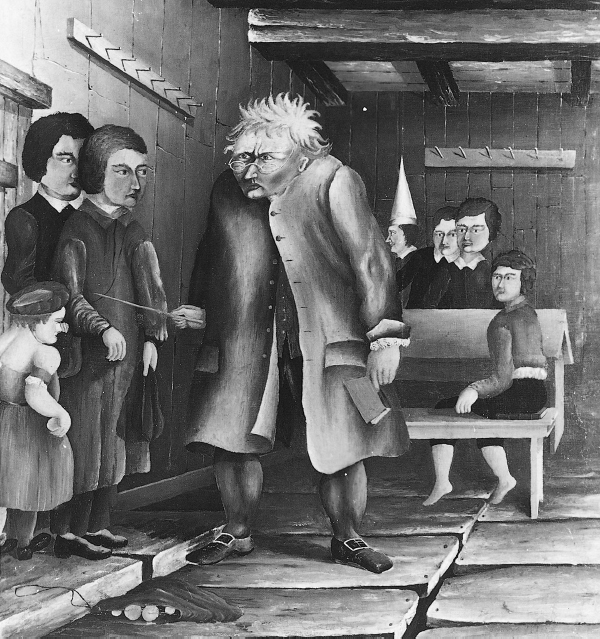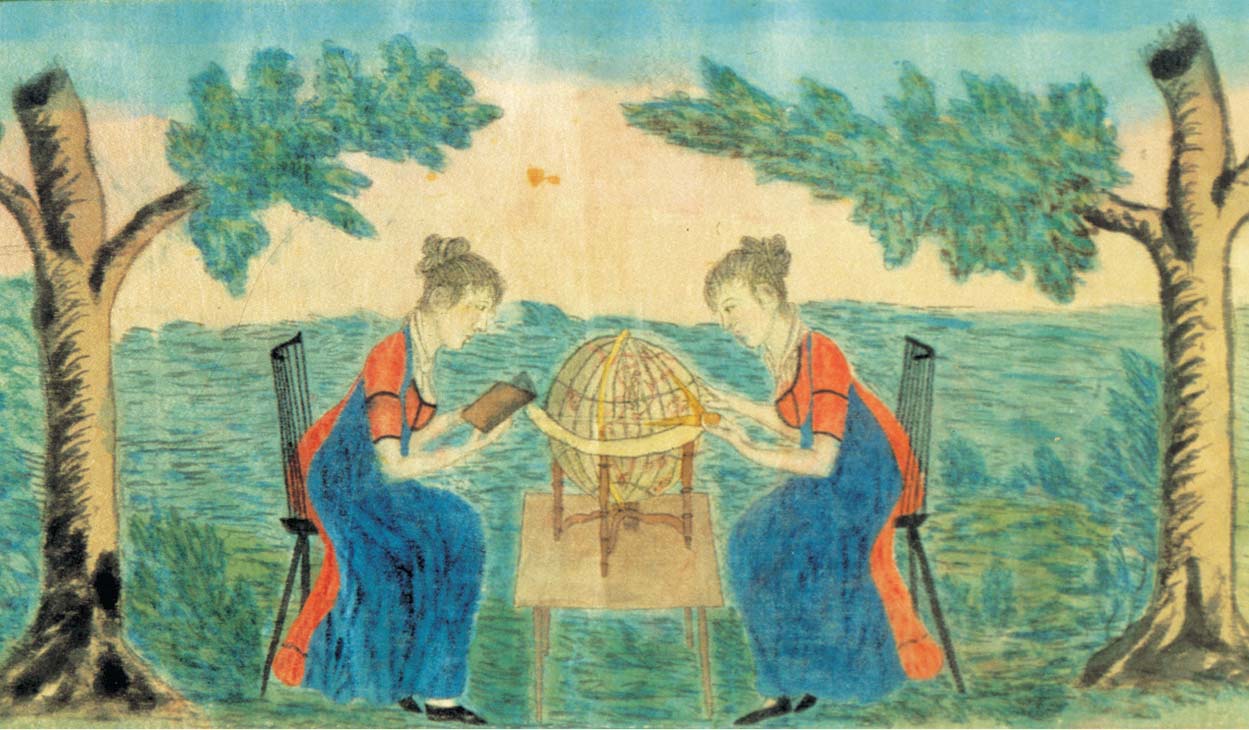America’s History: Printed Page 262
America: A Concise History: Printed Page 234
America’s History: Value Edition: Printed Page 227
Raising Republican Children
Republican values changed assumptions about inheritance and child rearing. English common law encouraged primogeniture, the bequest of the family’s property to the eldest son. After the Revolution, most state legislatures enacted statutes specifying equal division of the estate among all children, when there was no will. Most American parents applauded these statutes because they were already treating their children equally and with respect.
Two Modes of Parenting Indeed, many European visitors believed that republican parents gave their children too much respect and freedom. Because of the “general ideas of Liberty and Equality engraved on their hearts,” a Polish aristocrat suggested around 1800, American children had “scant respect” for their parents. Several decades later, a British traveler stood dumbfounded when an American father excused his son’s “resolute disobedience” with a smile and the remark, “A sturdy republican, sir.” The traveler speculated that American parents encouraged such independence to prepare youth to “go their own way” in the world.
Permissive child rearing was not universal. Foreign visitors interacted primarily with well-to-do Episcopalians and Presbyterians who held an Enlightenment conception of children. This outlook, transmitted by religious authors influenced by John Locke, viewed children as “rational creatures” best trained by means of advice and praise. The parents’ role was to develop their child’s conscience, self-discipline, and sense of responsibility. Families in the rapidly expanding middle class widely adopted this rationalist method of child rearing.
By contrast, many yeomen and tenant farmers, influenced by the Second Great Awakening, raised their children in an authoritarian fashion. Evangelical Baptist and Methodist writers insisted that children were “full of the stains and pollution of sin” and needed strict rules and harsh discipline. Fear was a “useful and necessary principle in family government,” minister John Abbott advised parents; a child “should submit to your authority, not to your arguments or persuasions.” Abbott told parents to instill humility in children and to teach them to subordinate their personal desires to God’s will.

Debates over Education Although families provided most moral and intellectual training, republican ideology encouraged publicly supported schooling. Bostonian Caleb Bingham, an influential textbook author, called for “an equal distribution of knowledge to make us emphatically a ‘republic of letters.’” Both Thomas Jefferson and Benjamin Rush proposed ambitious schemes for a comprehensive system of primary and secondary schooling, followed by college training for bright young men. They also envisioned a university in which distinguished scholars would lecture on law, medicine, theology, and political economy.
To ordinary citizens, whose teenage children had to labor in the fields or workshops, talk of secondary and college education smacked of elitism. Farmers, artisans, and laborers wanted elementary schools that would instruct their children in the “three Rs” — reading, ’riting, and ’rithmetic — and make them literate enough to read the Bible. In New England, locally funded public schools offered basic instruction to most boys and some girls. In other regions, there were few publicly supported schools, and only 25 percent of the boys and perhaps 10 percent of the girls attended private institutions or had personal tutors. Even in New England, only a few young men and almost no young women went on to grammar school (high school), and less than 1 percent of men attended college. “Let anybody show what advantage the poor man receives from colleges,” an anonymous “Old Soldier” wrote to the Maryland Gazette. “Why should they support them, unless it is to serve those who are in affluent circumstances, whose children can be spared from labor, and receive the benefits?”
Although many state constitutions encouraged support for education, few legislatures acted until the 1820s. Then a new generation of educational reformers, influenced by merchants and manufacturers, raised standards by certifying qualified teachers and appointing statewide superintendents of schools. To encourage students, the reformers chose textbooks such as Parson Mason Weems’s The Life of George Washington (c. 1800), which praised honesty and hard work and condemned gambling, drinking, and laziness. To bolster patriotism and shared cultural ideals, reformers required the study of American history. As a New Hampshire schoolboy, Thomas Low recalled: “We were taught every day and in every way that ours was the freest, the happiest, and soon to be the greatest and most powerful country of the world.”

Promoting Cultural Independence Like Caleb Bingham, writer Noah Webster wanted to raise the nation’s intellectual prowess. Asserting that “America must be as independent in literature as she is in politics,” he called on his fellow citizens to free themselves “from the dependence on foreign opinions and manners, which is fatal to the efforts of genius in this country.” Webster’s Dissertation on the English Language (1789) celebrated language as a marker of national identity by defining words according to American usage. With less success, it proposed that words be spelled as they were pronounced, that labour (British spelling), for example, be spelled labur. Still, Webster’s famous “blue-back speller,” a compact textbook first published in 1783, sold 60 million copies over the next half century and served the needs of Americans of all backgrounds. “None of us was ’lowed to see a book,” an enslaved African American recalled, “but we gits hold of that Webster’s old blue-back speller and we … studies [it].”
Despite Webster’s efforts, a republican literary culture developed slowly. Ironically, the most successful writer in the new republic was Washington Irving, an elitist-minded Federalist. His whimsical essay and story collections — which included the tales of “Rip Van Winkle” and “The Legend of Sleepy Hollow” — sold well in America and won praise abroad. Frustrated by the immaturity of American cultural life, Irving lived for seventeen years in Europe, reveling in its aristocratic culture and intense intellectuality.
Apart from Irving, no American author was well known in Europe or, indeed, in the United States. “Literature is not yet a distinct profession with us,” Thomas Jefferson told an English friend. “Now and then a strong mind arises, and at its intervals from business emits a flash of light. But the first object of young societies is bread and covering.” Not until the 1830s and 1840s would American authors achieve a professional identity and make a significant contribution to Western literature (see “Emerson’s Literary Influence”).
UNDERSTAND POINTS OF VIEW
Question
Which form of child rearing — the rationalist or the authoritarian — was the most compatible with republican values and why?